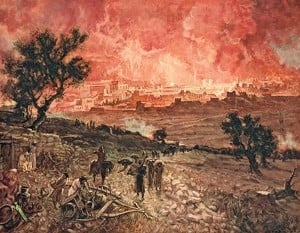The Destruction of Jerusalem – Hit the Mark
Jerusalem was destroyed because of bad leadership.
In spite of their favored status as a nation, their miraculous deliverance from bondage and their mighty triumphs against their national foes, God’s people forsook Him to worship and serve idols. Yes, the people were culpable in these crimes against heaven, yet had those in leadership been true to their calling, the destruction of Jerusalem would have never happened.
As we have studied the book of Jeremiah we see spelled out how kings came and went who were evil. Their example in disregarding the will of God was replicated among the people. Like a breath of fresh air, we looked at the life of King Josiah and his marked determination to reverse the tide of idolatry and wickedness that flourished under the leadership of his forefathers. As he led in righteousness the people followed.
Now this week as we look at The Destruction of Jerusalem, we see again how a king would choose a course that would have a devastating effect upon his people. To King Zedekiah, Jeremiah had been as plain as could be in outlining what it would take to spare the people from the deadly results of their national sins. God dictated to Jeremiah a message of mercy.
“It may be that the house of Judah will hear all the adversities which I purpose to bring upon them, that everyone may turn from his evil way, that I may forgive their iniquity and their sin.” Jeremiah 36:3
Placed before King Zedekiah was a roadmap to preserve the lives of his people. In his hands were life and death and his choice would be the de facto choice of the nation. The biblical record shows that he rejected the wisdom of God and looked to himself and others for his deliverance.
“Now King Zedekiah the son of Josiah reigned instead of Coniah the son of Jehoiakim, whom Nebuchadnezzar king of Babylon made king in the land of Judah. But neither he nor his servants nor the people of the land gave heed to the words of the Lord which He spoke by the prophet Jeremiah.” Jeremiah 37:1-2
We see this same scenario played out in the nations of the world today. Leaders, through vain ambitions, and thirst for power, have led countless numbers of their people into misery and death. Our news feeds are full of shocking pictures of refugees around the world. Innocent families, helpless children and widows in mourning all bear the fallout from disastrous decisions by those appointed to lead.
No leader can be charged with controlling the inward, personal sins of those they lead. However, leaders set the tone for the directions of their nations and the broader sentiments they commonly share. King Zedekiah, in refusing the humbling direction of God, unleashed on his people their destruction and Jerusalem was destroyed.
It would be an exercise in futility for me to try to put into words how life-changing the destruction of this fabled city was to its occupants. Not only did many suffer severe privations during the ongoing siege, but many suffered cruel deaths as the city was overthrown. Those carried away into captivity not only lost all of their earthly possessions, they also lost their identity as the favored nation of God. And this was largely brought about by bad leadership.
“Woe to the shepherds who destroy and scatter the sheep of My pasture!” says the Lord. Therefore thus says the Lord God of Israel against the shepherds who feed My people: “You have scattered My flock, driven them away, and not attended to them. Behold, I will attend to you for the evil of your doings,” says the Lord. Jeremiah 23:1-2
Yet, even in the destruction of Jerusalem the mercy of God was operating. Although to outward appearances they were forsaken of heaven, God, with mercy, was still watching over them. In the land of their banishment, far removed from the ruins of Jerusalem, God’s mercy and forgiveness had already set in motion their eventual deliverance. But would the people learn from their mistakes?
Here are a few Hit the Mark questions for this week’s lesson discussion:
- What does accountability mean to you?
- Is it true that there are degrees of guilt when it comes to sin? Explain your answer.
- Is it true that religious leaders have to live “better” lives than those they lead? Explain your answer.
- Is it true that since the Bible says God sets up rulers, we should not do anything to remove a leader prematurely? Why yes or no?
- Is it true that for the sake of unity we should go along with what our leaders decide? Explain your answer.
- How does the church maintain a united front while at the same time deal with issues of leadership decisions that are questionable or controversial?
- Is the following statement True, Mostly True, Somewhat True or Not True: The current state of the spirituality of the church is a general reflection of the spirituality of our leaders. Explain your answer.
We close this week’s lesson with a solemn passage spoken by Christ. It appears that the nation, even in His day, was slow to learn the lessons from its fallen state:
“O Jerusalem, Jerusalem, the one who kills the prophets and stones those who are sent to her! How often I wanted to gather your children together, as a hen gathers her brood under her wings, but you were not willing!” Luke 13:34
Until next week, let’s all continue to Hit the Mark in Sabbath School!

